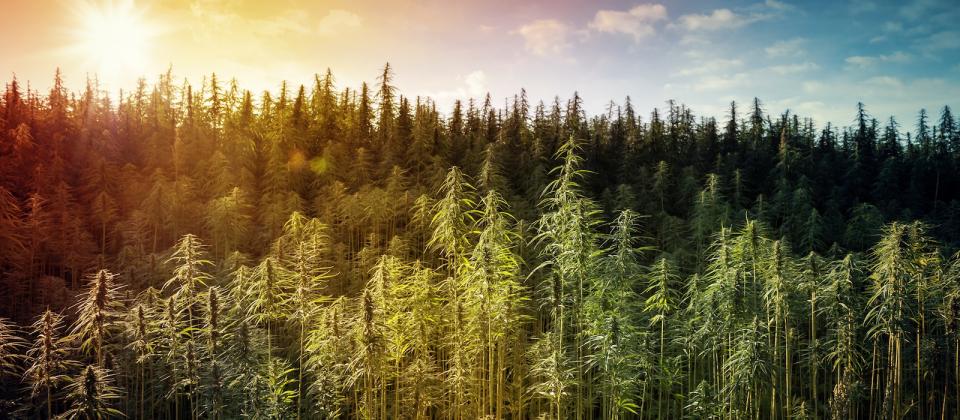Cannabis-friendly laws are sweeping the U.S. The 2018 Farm Bill, signed by President Donald Trump, opens the way for growers to produce industrial hemp, a major step forward, although not big enough if compared to the current legislation in force in the states where recreational pot is already legal. This would anyway give another chance to a once-mighty industry that faded to black some time ago, an industry that now faces a brighter-than-ever future, in the midst of a trade war with another heavyweight of the hemp field: China.

The United States keeps moving, little by little, towards a more permissive legislation on marijuana. It was in December 2018 that the Farm Bill became legal with Trump's signature. This legislation is renewed once every five years so the U.S. legal framework on agriculture can tackle the emerging challenges and open doors to create opportunities. One of the most important changes is that it removes hemp and any hemp derivative from the Controlled Substances Act, totally separating it from marijuana.
This means that the cultivation of industrial hemp is indeed legal, although with certain limits. Producers have to stick to some rules and respect them with the greatest integrity.

The bill defines hemp as a plant with less than 0.3% THC (the legal limit for a substance to be considered a drug in the U.S.), meaning the Food and Drug Administration (FDA) will still keep a watchful eye on every step of the cultivation process in order to guarantee it is in line with the standards set by the laws. Those who don't comply with the regulatory framework will face significant penalties. The industry, therefore, expects the trade difficulties and financial obstacles so far affecting them to disappear with the enactment of this recently-signed federal legislation.
Hemp and all of its derivatives have now been officially removed from the Controlled Substances Act.
The 2018 Farm Bill has triggered some changes within the FDA too, who reacted to the enactment with the announcement of a possible more permissive regulation on the production and trade of cannabis derivatives. So, in the next few months, we expect them to set clear and specific parameters that will facilitate interstate commerce. Now, buying CBD derivatives such as oil, beverages, and ointments will be far easier thanks to the harmonization of the different legal frameworks. For everybody's point of view to be taken into account, a public meeting has already been called. This way, all parties involved will have their chance to put forward their ideas.

One step behind
While it's true that hemp being mentioned in this new Farm Bill constitutes unprecedented progress at the federal level, some states already have far more permissive laws in force. In fact, medical cannabis is legal in 33 states, as recreational pot is in Oregon, Alaska, Washington, Colorado, California, Ohio, Maine, Massachusetts, and Michigan, as well as in the District of Columbia.
Besides those, not long before President Trump signed the Farm Bill, the governors of New Jersey, New York, and New Mexico had announced that recreational cannabis would become legal during 2019.
The federal government has always been rather reluctant to accept a more open approach. Trump was actually expected to continue with the very same repressive attitude, especially since the revelation of some of the White House's anti-marijuana secrets.
Those who don't comply with the regulatory framework will face significant penalties.
With the Marijuana Policy Coordination Committee in the lead, they've strived to counteract positive marijuana messages in order to change the positive pro-weed position of most U.S. citizens. That's why these new laws on the cultivation of hemp, although not particularly revolutionary, bring in a breath of fresh air and boost the hopes of those in favor of cannabis legalization.
An industry with a past… and a future
During the first half of the 20th century, the hemp industry did nothing but grow. However, in 1937, for fear that cannabis use could end up being uncontrollable, the U.S. Congress tried to damage the cannabis industry by passing the Marijuana Tax Act, which didn't make any distinction between subspecies. After this first devastating blow, the hemp industry was sentenced to death with the enactment of the Controlled Substances Act in 1970, a federal U.S. drug policy that tightened up legislation and restrictively banned cannabis and hemp alike.

This ban on industrial hemp is now reversed, meaning it's now viewed as an agricultural product rather than a drug. With this, the industry has been offered the chance to aim high once again, to regain the place it had a century ago. Evidently, this new situation is expected to bring about loads of changes and positive economic consequences for hemp is a versatile plant that could replace plastic, cosmetics, foodstuffs, textiles… Other sectors and the nation's economy, in general, are eagerly waiting for this to happen.
Some analysts have suggested that this action by the Trump administration stems from the trade war with China. With declining cereal, rapeseed, corn, and soy exports, and the subsequent decrease in production as a result of the new protectionist and tariff measures set by the government, it's their way of providing an alternative to the farmers. In so doing, they not only prevent their popularity ratings from dropping, but they also make use of every patch of land available and summon the strength to confront the Asian giant that has become the global hemp production and export powerhouse. Having said this, it's kind of easy to figure out why Trump has decided to promote the cultivation of hemp: to fuel export shares for an industry that is expected to bring in nothing but benefits.





hopefully soon all states have medical & rec. cannabis !!! IT'S MY MED.